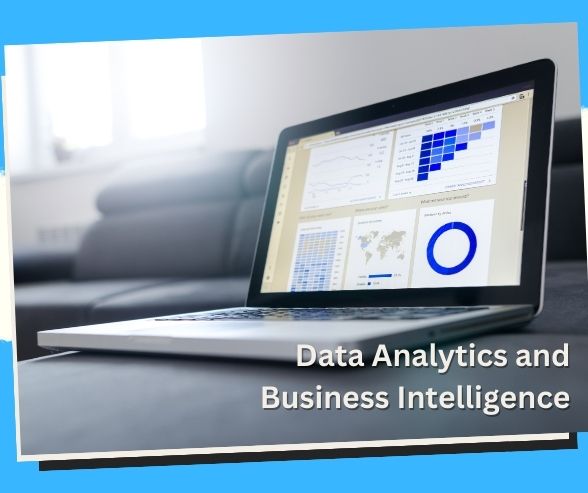
 Embrace the Data Revolution: Building a Data-Driven Culture for Success!
Embrace the Data Revolution: Building a Data-Driven Culture for Success! 
Unleash the power of data in your business! 
 Data-Driven Culture: Fostering Analytics Adoption in Businesses
Data-Driven Culture: Fostering Analytics Adoption in Businesses 
In today’s digitally driven world, data is the lifeblood of businesses. It’s not just about collecting data; it’s about leveraging it to gain insights, make informed decisions, and drive innovation. To achieve this, fostering a data-driven culture within your organization is paramount. This article will explore the importance of a data-driven culture and how it can foster analytics adoption in businesses.
Understanding the Data-Driven Culture
A data-driven culture is a mindset that places data at the heart of every decision-making process. It’s about relying on data and insights rather than gut feelings or anecdotal evidence. When a data-driven culture is deeply ingrained within an organization, it permeates every level and department, from top-level executives to entry-level employees.

The Core Principles of a Data-Driven Culture:
- Data Collection: Data is collected systematically and consistently from various sources.
- Data Analysis: Data is analyzed to derive meaningful insights and trends.
- Data-Driven Decision-Making: Decisions are based on data and analysis rather than intuition.
- Continuous Learning: Employees are encouraged to learn and adapt based on data-driven feedback.
- Transparency: Data and insights are shared openly throughout the organization.
The Significance of a Data-Driven Culture
Embracing a data-driven culture can have a profound impact on a business. Here are some of the key benefits:
1. Informed Decision-Making
Data-driven decisions are typically more accurate and less prone to biases. When decisions are grounded in data, organizations can avoid costly mistakes and capitalize on opportunities.
2. Increased Efficiency
A data-driven approach helps organizations optimize operations, identify inefficiencies, and allocate resources more effectively. This leads to increased productivity and cost savings.
3. Competitive Advantage
Organizations can spot emerging trends, market shifts, and customer preferences in a data-driven culture before their competitors. This enables them to stay ahead in the market.
4. Innovation
Data-driven cultures encourage experimentation and innovation. Employees are more likely to propose and implement new ideas when data support them.
5. Customer-Centric Approach
Understanding customer behavior and preferences is crucial for business success. A data-driven culture enables organizations to tailor their products and services to customer needs.
6. Accountability
In a data-driven culture, employees take ownership of their work, as their performance is measured and evaluated using data. This fosters a sense of accountability and responsibility.
Overcoming Challenges in Fostering a Data-Driven Culture
While the benefits of a data-driven culture are clear, implementing it is not without its challenges. Here are some common obstacles and strategies to overcome them:
Challenge 1: Resistance to Change
Strategy: Change management is essential. Leaders must communicate the benefits of a data-driven culture and provide training and support to employees as they adapt.
Challenge 2: Data Quality Issues
Strategy: Prioritize data quality by implementing data governance and quality control measures. Ensure that data sources are reliable and consistent.
Challenge 3: Lack of Data Literacy
Strategy: Invest in data literacy training for employees at all levels. This empowers them to interpret data and use it effectively.
Challenge 4: Siloed Data
Strategy: Create a unified data platform that consolidates data from various departments. This fosters collaboration and a holistic view of the organization’s performance.
Challenge 5: Unclear Objectives
Strategy: Define clear goals and objectives for the data-driven culture. Ensure that everyone understands what they are working towards.
Strategies for Fostering Analytics Adoption
Once a data-driven culture is established, the next step is to ensure that analytics adoption is widespread and practical. Here are some strategies to achieve this:
1. Leadership Buy-In
Leaders must set an example by using data in their decision-making processes. When executives embrace data analytics, it sends a powerful message throughout the organization.
2. Data-Driven KPIs
Key Performance Indicators (KPIs) should be data-driven and aligned with organizational goals. These KPIs should be monitored and regularly communicated to employees.
3. User-Friendly Analytics Tools
Choose user-friendly analytics tools that are accessible to employees at all levels. Ease of use encourages adoption and empowers non-technical users to work with data.
4. Training and Education
Invest in training and education programs that build data literacy among employees. These programs can range from basic data analysis skills to advanced data science training.

5. Data Access and Transparency
Make data easily accessible to employees. Implement dashboards and reporting systems that allow users to explore and analyze data independently. Transparency in data sharing is key.
6. Encourage Data-Driven Decision-Making
Promote a culture where employees are encouraged to use data when making decisions. Recognize and reward data-driven successes.
7. Data Storytelling
Teach employees the art of data storytelling. Being able to communicate data insights effectively is crucial for decision-makers.
8. Cross-Functional Teams
Encourage collaboration between departments and the sharing of data insights. Cross-functional teams can address complex business challenges more effectively.
9. Pilot Projects
Initiate pilot projects that showcase the benefits of data analytics. Successful pilots can motivate others to adopt data-driven practices.
10. Feedback Loops
Implement feedback loops to assess the effectiveness of data-driven initiatives continuously. Use feedback to refine processes and tools.
Case Studies in Analytics Adoption
To illustrate the real-world impact of a data-driven culture, let’s take a look at a few case studies:
Netflix: Personalized Content Recommendations
Netflix has built its empire on data-driven content recommendations. By analyzing user behavior and preferences, they can suggest movies and shows that align with individual tastes, increasing user engagement and retention.

Amazon: Inventory Management
Amazon uses data analytics to optimize its inventory management. By analyzing sales data, they can predict demand and ensure that products are available when customers want them, reducing storage costs and increasing customer satisfaction.

Spotify: Music Personalization
Spotify leverages data analytics to provide highly personalized music recommendations to its users. This approach enhances the user experience and keeps people engaged with the platform.

The Path Forward
Fostering a data-driven culture and promoting analytics adoption is an ongoing journey. It requires commitment, leadership, and continuous learning. Businesses embracing a data-driven culture will survive and thrive in a world where data is abundant.
Remember, a data-driven culture is not just about the technology or tools; it’s about people and their willingness to embrace data as a valuable resource for decision-making. So, embark on this journey enthusiastically and watch your organization thrive in the age of data.
Related Queries
Data-driven Culture
Fostering Analytics Adoption
Business Success
Unlocking Data Insights
Key to Prosperity
Data-Driven Decisions
Navigating the Data Storm
Data Skeptics to Champions
Culture of Analytics
Data-Driven Success
Save/Share this story with QR CODE
Disclaimer
This article is for informational purposes only and does not constitute endorsement of any specific technologies or methodologies and financial advice or endorsement of any specific products or services.
 Need to get in touch?
Need to get in touch?

We appreciate your reading. 
1.) 

Your DONATION will be used to fund and maintain NEXTGENDAY.com
Subscribers in the Philippines can make donations to mobile number 0917 906 3081, thru GCash.
3.) 
4.) 
AFFILIATE PARTNERS

World Class Nutritional Supplements - Buy Highest Quality Products, Purest Most Healthy Ingredients, Direct to your Door! Up to 90% OFF.
Join LiveGood Today - A company created to satisfy the world's most demanding leaders and entrepreneurs, with the best compensation plan today.

 Business, Finance & Technology
Business, Finance & Technology

 Business Technology, Finance Technology & Information Technology
Business Technology, Finance Technology & Information Technology













